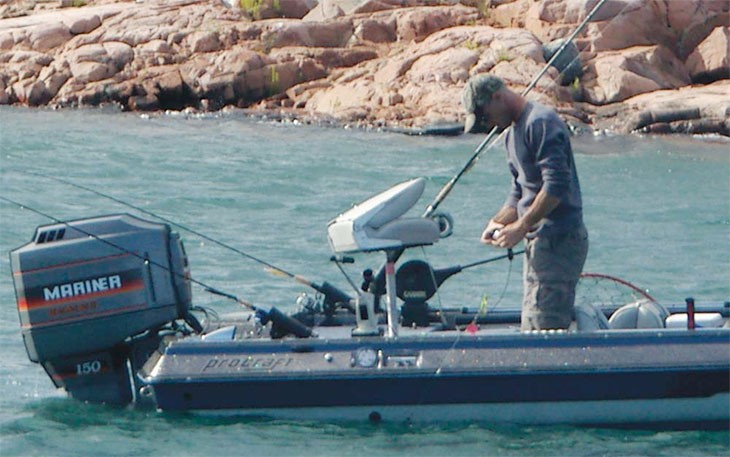By Mark King
from issue 27-2
Safe boating tips for the single boater
No, this isn’t a column about safe boating after dating failure. It’s about boating safely when you are by yourself.
People boat by themselves for many reasons. Hunting and fishing are listed among the biggest reasons but, there are other circumstances where boaters may find themselves alone on the water.
You could be the last to arrive for the weekend at a cottage. You could be moving your boat at the start, or the end, of the season. You could be in your dinghy sightseeing, swimming or fishing. Maybe you are heading to shore to get supplies or, maybe you are taking the dog to take care of business. Or, maybe you just feel like being out alone once in awhile.
The point is, most of us will end up alone on a boat at some time or other. At least, most men will.
This isn’t being sexist. Statistics show that it is usually a male who is out alone on the water when trouble strikes and every year there are a large number of male, single boaters who get into trouble on the water, sometimes ending in tragic results
And here’s the final fact that will cause you to think. It’s nature’s fault. A large number of men, who have been out boating by themselves and who wind up in the water, are found with their fly open having lost their balance and fallen overboard while taking care of their own business. Sometimes alcohol is involved and sometimes it isn’t. Usually cooler water and bulky clothing are also involved.
So how can we avoid becoming a statistic? We can arrive alive by following a few of the basic safety rules.
Bulky clothing is a natural defence against cooler weather. When hunting, fishing and moving the boat early and late in the season, it is only natural to layer our clothes and include one or two bulky layers.
When submerged, in a panic situation, such clothing can soak up water at an amazing rate. The effect is to pull a person underwater. Screaming for help at the same time – which is a natural reaction – is a deadly exercise.
If you ever find yourself in the water with heavy clothes on do not panic. Stay calm and think.
When submerged, heavy clothing and waders will provide floatation if you can trap the air that is in them when you entered the water. Bend your knees to trap air in the lower part of the waders. Keep air in your clothes by turning on you back and paddling slowly toward safety.
Panicky actions, or trying to remove the clothing, will release any air that is trapped in them and it will be replaced by water.
Of course all this work can be aided with the assistance of a life jacket.
Without going into the rules for lifejackets it is doubly important when you are alone and to wear your life jacket.
If you refuse to wear it, at least make sure that it fits properly. Don’t forget that it may have to be re-adjusted to fit over heavy clothing if you are boating in cooler weather.
And make sure it is always within reach so you can take it with you if you end up heading over the side.
Make sure the lifejacket is in good repair.
Before you head out on the water, make sure you have filed a trip plan or at least told someone who is responsible and who will be watching out for you, where you are going and what you are doing. Then, even if you don’t end up in the water but the boat breaks down, you know someone will be looking for you.
Of course, you should have emergency equipment on board to signal for help when it approaches.
If possible, try not to boat alone. Find a buddy to take along with you.
To avoid ending up in a situation that you can’t help when nature calls, take an empty jug along with you that you can use while kneeling in the bottom of the boat.
Here’s a sobering fact. According to statistics, about half the folks who drown while boating each year have ingested alcohol.
Statistically if you have been drinking you are more likely to fall out of the boat. Alcohol reduces your body’s ability to retain heat and a drunken person who falls out of a boat may become disoriented and swim down into danger instead of up into safety. This is especially true in low light situations.
If you go over, release a bit of air from your lungs and follow the bubbles to the surface.
With a float plan filed, no alcohol on board, your lifejacket on, and perhaps a buddy with you and an empty jug, you only have to worry about one more thing … how not to fall overboard.
You’ve probably heard the saying, “one hand for the ship and one hand for yourself.” This means you should be holding on at all times.
There is another rule that is even better. That is keeping three points of contact with the boat at all times, either two feet and one hand, or two hands and one foot. You could still lose your balance but you would at least be well-connected with the boat.
You should also stay as low as possible to keep your center of gravity inside the boat hull, and remain as close to the center of the boat as possible. This means do not sit on the gunwales and to do sit on the backs of seats.
Warning your friend of any manoeuvres you are about to make will keep them in the boat and making sure that everyone on board has non-slip soles on their feet will help prevent slips and falls.
By following these simple rules, you can continue to be a safe, single boater.

